The Intel Core i9-9980XE CPU Review: Refresh Until it Hertz
by Ian Cutress on November 13, 2018 9:00 AM ESTHEDT Performance: Office Tests
The Office test suite is designed to focus around more industry standard tests that focus on office workflows, system meetings, some synthetics, but we also bundle compiler performance in with this section. For users that have to evaluate hardware in general, these are usually the benchmarks that most consider.
All of our benchmark results can also be found in our benchmark engine, Bench.
PCMark 10: Industry Standard System Profiler
Futuremark, now known as UL, has developed benchmarks that have become industry standards for around two decades. The latest complete system test suite is PCMark 10, upgrading over PCMark 8 with updated tests and more OpenCL invested into use cases such as video streaming.
PCMark splits its scores into about 14 different areas, including application startup, web, spreadsheets, photo editing, rendering, video conferencing, and physics. We post all of these numbers in our benchmark database, Bench, however the key metric for the review is the overall score.
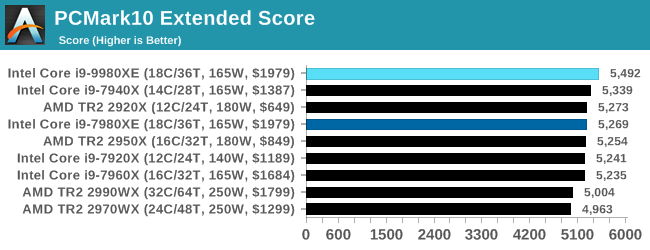
A small bump in the result here because of the added core frequency.
Chromium Compile: Windows VC++ Compile of Chrome 56
A large number of AnandTech readers are software engineers, looking at how the hardware they use performs. While compiling a Linux kernel is ‘standard’ for the reviewers who often compile, our test is a little more varied – we are using the windows instructions to compile Chrome, specifically a Chrome 56 build from March 2017, as that was when we built the test. Google quite handily gives instructions on how to compile with Windows, along with a 400k file download for the repo.
In our test, using Google’s instructions, we use the MSVC compiler and ninja developer tools to manage the compile. As you may expect, the benchmark is variably threaded, with a mix of DRAM requirements that benefit from faster caches. Data procured in our test is the time taken for the compile, which we convert into compiles per day.
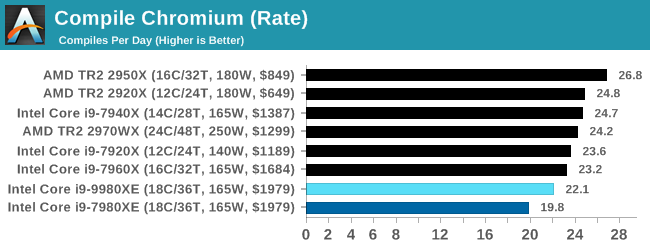
For the compile test, the 9980XE brings the 18-core up to being more competitive, however this test does seem to prefer fewer cores, lower crosstalk, and higher frequencies. AMD's 16-core TR2 wins here, adding 20% perf over the 9980XE for under half the cost.
3DMark Physics: In-Game Physics Compute
Alongside PCMark is 3DMark, Futuremark’s (UL’s) gaming test suite. Each gaming tests consists of one or two GPU heavy scenes, along with a physics test that is indicative of when the test was written and the platform it is aimed at. The main overriding tests, in order of complexity, are Ice Storm, Cloud Gate, Sky Diver, Fire Strike, and Time Spy.
Some of the subtests offer variants, such as Ice Storm Unlimited, which is aimed at mobile platforms with an off-screen rendering, or Fire Strike Ultra which is aimed at high-end 4K systems with lots of the added features turned on. Time Spy also currently has an AVX-512 mode (which we may be using in the future).
For our tests, we report in Bench the results from every physics test, but for the sake of the review we keep it to the most demanding of each scene: Cloud Gate, Sky Diver, Fire Strike Ultra, and Time Spy.
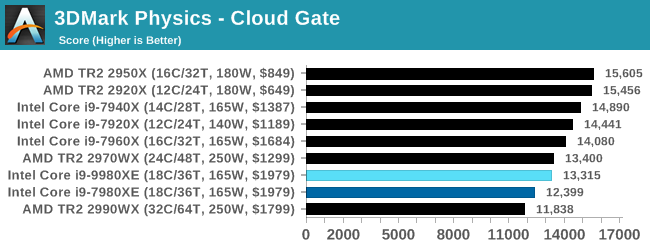
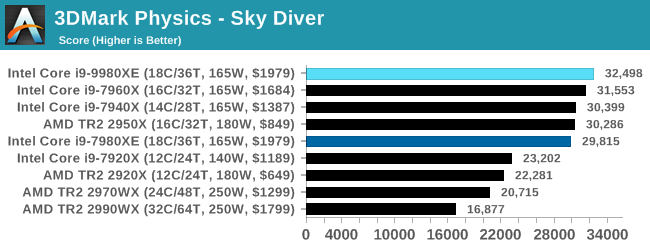
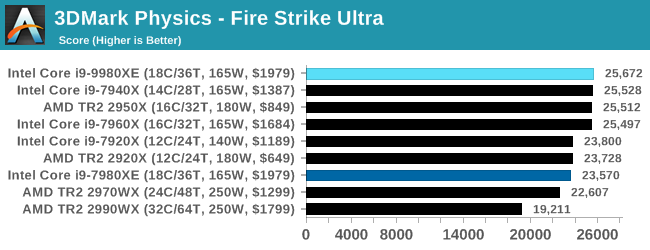
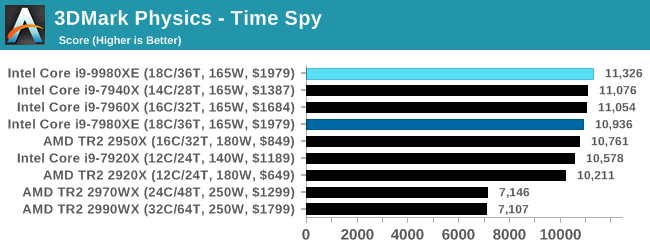
The newer engines can take advantage of the higher core count parts, and Intel's unified memory design also helps here.
GeekBench4: Synthetics
A common tool for cross-platform testing between mobile, PC, and Mac, GeekBench 4 is an ultimate exercise in synthetic testing across a range of algorithms looking for peak throughput. Tests include encryption, compression, fast Fourier transform, memory operations, n-body physics, matrix operations, histogram manipulation, and HTML parsing.
I’m including this test due to popular demand, although the results do come across as overly synthetic, and a lot of users often put a lot of weight behind the test due to the fact that it is compiled across different platforms (although with different compilers).
We record the main subtest scores (Crypto, Integer, Floating Point, Memory) in our benchmark database, but for the review we post the overall single and multi-threaded results.
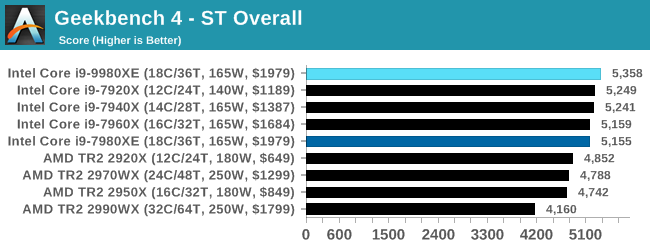
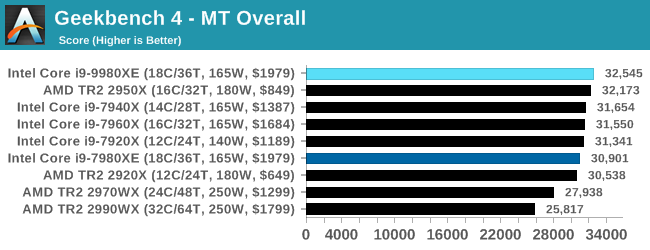










143 Comments
View All Comments
imaheadcase - Tuesday, November 13, 2018 - link
Yah because you don't do anything intensive with the jobs you have, of course you would use laptops or whatever mobile. But the reality is most people would use desktops because simply faster to get stuff done, and more powerful.BYOD fyi is not like that for most companies..
imaheadcase - Tuesday, November 13, 2018 - link
..and if you are doing anything intensive with laptops..that just means company you work for is behind the curve and just being cheap and not fork out money for the right hardware.PeachNCream - Tuesday, November 13, 2018 - link
There are over 250K people on the payroll. There ARE desktop PCs around, but they are few and far between. I'm not going to get into an extended debate about this because it won't change anyone's perspective, but I do believe you've got a slight misconception about the usefulness and flexibility of portable computer hardware. A simple look at the availability of desktops versus laptops should be enough to make it obvious, for most people, computer == laptop these days.Spunjji - Tuesday, November 13, 2018 - link
You're eliding the difference between "convenient and sufficient" and "as powerful as anyone needs".I'll absolutely grant that if you're only going to have one system for doing your work and you move around a fair bit, then it absolutely makes sense to have that system be mobile, even if you lose a bit of edge-case performance.
For people doing /serious/ GPU grunt work something like an XPS 15 is going to provide between 1/2 and 1/3 of the power they could get with a similarly priced desktop. That compromise doesn't make any sense for someone whose job does not require mobility.
So sure, notebooks are better than ever for a large number of people. Doesn't make desktops and HEDT chips functionally irrelevant for businesses, though. If you can really use 18 cores for the work you're doing then being provided with an XPS 15 will be, at best, a sad joke.
Ratman6161 - Tuesday, November 13, 2018 - link
Any laptop is essentially on a different planet than any of the processors covered in this review (doesn't matter if we are talking Intel or AMD).1. If it is possible to do your work on a laptop (which I am myself at this very moment) then you (and me) are not the target audience for these CPU's. In fact, I'm not entirely sure why you even bother to read or comment on the story?
2. If you have to ask if you need it, you don't need it.
3. If you have to think more than about 1 second to make a decision between one of these and a laptop, then you don't need it.
4. If you do need one, then you already know that.
Most people don't need one, including me. I read these things because the technology is interesting and because I find it interesting what others might be doing. I don't really feel any need to insist that others need what I need and could not possibly need anything else.
PeachNCream - Wednesday, November 14, 2018 - link
So a differing opinion than yours should mean that someone not read an article or comment on it. That appears to be nothing more than a self-protective mechanism intended to erect a bubble in which exists nothing more than an echo chamber filled with your own beliefs. That's hardly a way to integrate new thinking, but I do understand that a lot of people fear change in the same way you do.Kilnk - Tuesday, November 13, 2018 - link
"But the reality is most people would use desktops because simply faster to get stuff done, and more powerful."See, that's the problem with your reasoning. You assume that most people need power when they do not. The reality is that the majority of people who need to use computers for work do not need to do rendering or any kind of intensive task. So no, most people don't use desktops nor would they want to use desktops given the opportunity. They use laptops.
FunBunny2 - Tuesday, November 13, 2018 - link
"Now we live in a BYOD (bring your own device) world where the company will pay up to a certain amount (varies between $1,100 and $1,400 depending on funding from upper echelons of the corporation) and employees are free to purchase the computer hardware they want for their work. There are no desktop PCs currently and in the past four years, only one person purchased a desktop in the form of a NUC. "The Man's advantage to the Worker Bees using laptops: their always 'on the job'. no time off. as close to slavery as it's legal to be. some smart folks are truly stupid.
PeachNCream - Tuesday, November 13, 2018 - link
"The Man's advantage to the Worker Bees.." (just quoting because of the lack of continuing indents in Anandtech's 1990's-era comment system)I think that's a bit of a stretch in our case. My division doesn't do on-call and we strictly prohibit our lower tier managers from tapping employees outside of their normal work hours. Even checking company e-mail outside of work hours is against posted (and enforced) policy. If we must, due to emergencies, they absolutely have to be compensated for the time regardless of whether or not they are hourly or salaried workers. I haven't seen an "emergency" that couldn't wait until the next day so that policy has not been put into use in at least the last five years. Computational mobility is no excuse to allow invasions into off-the-clock time and I for one won't allow it.
jjjag - Tuesday, November 13, 2018 - link
I hate to admit it but PNC is right. Super-high-powered desktops are an anachronism. If you need REAL horsepower, you build a server/compute farm and connect to it with thin-client laptops. If you are just doing software development, the laptop cpu is usually good enough.This is especially true of single socket monsters like these HEDT chips. The only reason they exist is because gamers will pay too much for everything. It's nothing more than an expensive hobby, and like all hobbies at the top end is all "want" and very little "need". The "need" stops somewhere around 6 or 8 cores.
It's exactly the same as owning a Ferrari and never taking it to the track. You will never use more than 20% of the full capabilities of it. All you really need is a Vette.